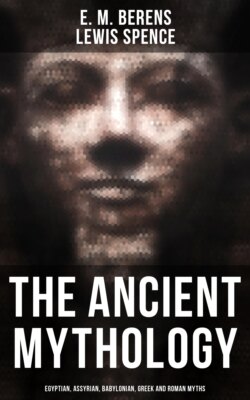Читать книгу The Ancient Mythology: Egyptian, Assyrian, Babylonian, Greek and Roman Myths - Lewis Spence - Страница 100
На сайте Литреса книга снята с продажи.
The Legend of Zu
ОглавлениеIt is told of the god Zu that on one occasion ambition awaking in his breast caused him to cast envious eyes on the power and sovereignty of Bel, so that he determined to purloin the Tablets of Destiny, which were the tangible symbols of Bel's greatness.
At this time, it may be recalled, the Tablets of Destiny had already an interesting history behind them. We are told in the creation legend how Apsu, the primeval, and Tiawath, chaos, the first parents of the gods, afterward conceived a hatred for their offspring, and how Tiawath, with her monster-brood of snakes and vipers, dragons and scorpion-men and raging hounds, made war on the hosts of heaven. Her son Kingu she made captain of her hideous army—
To march before the forces, to lead the host,
To give the battle-signal, to advance to the attack,
To direct the battle, to control the fight.
To him she gave the Tablets of Destiny, laying them on his breast with the words: "Thy command shall not be without avail, and the word of thy mouth shall be established." Through his possession of the divine tablets Kingu received the power of Anu, and was able to decree the fate of the gods. After several deities had refused the honour of becoming champion of heaven, Merodach was chosen. He succeeded at length in slaying Tiawath and destroying her evil host; and having vanquished Kingu, her captain, he took from him the Tablets of Destiny, which he sealed and laid on his own breast. It was this Merodach, or Marduk, who afterward became identified with Bel.
Now Zu, in his greed for power and dominion, was eager to obtain the potent symbols. He beheld the honour and majesty of Bel, and from contemplation of these he turned to look upon the Tablets of Destiny, saying within himself:
"Lo, I will possess the tablets of the gods, and all things shall be subject unto me. The spirits of heaven shall bow before me, the oracles of the gods shall be in my hands. I shall wear the crown, symbol of sovereignty, and the robe, symbol of godhead, and then shall I rule over all the hosts of heaven."
Thus inflamed, he sought the entrance to Bel's hall, where he awaited the dawn of day. The text goes on:
Now when Bel was pouring out the clear water, (i.e. thelight of day?) And his diadem was taken off and lay upon the throne, (Zu) seized the Tablets of Destiny, He took Bel's dominion, the power of giving commands. Then Zu fled away and hid himself in his mountain.
Bel was greatly enraged at the theft, and all the gods with him. Anu, lord of heaven, summoned about him his divine sons, and asked for a champion to recover the tablets. But though the god Ramman was chosen, and after him several other deities, they all refused to advance against Zu.
The end of the legend is unfortunately missing, but from a passage in another tale, the legend of Etana, we gather that it was the sun-god, Shamash, who eventually stormed the mountain-stronghold of Zu, and with his net succeeded in capturing the presumptuous deity.
This legend is of the Prometheus type, but whereas Prometheus (once a bird-god) steals fire from heaven for the behoof of mankind, Zu steals the Tablets of Destiny for his own. These must, of course, be regained if the sovereignty of heaven is duly to continue, and to make the tale circumstantial the sun-god is provided with a fowler's net with which to capture the recalcitrant Zu-bird. Jastrow believes the myth to have been manufactured for the purpose of showing how the tablets of power were originally lost by the older Bel and gained by Merodach, but he has discounted the reference in the Etana legend relating to their recovery.
